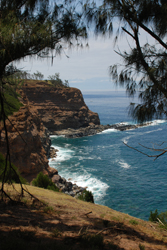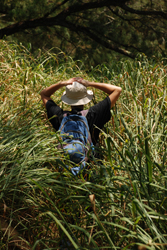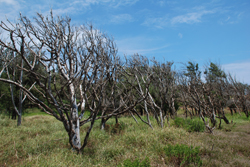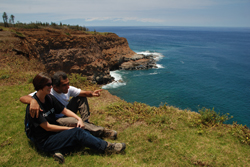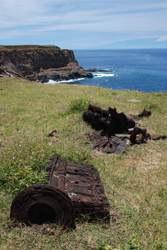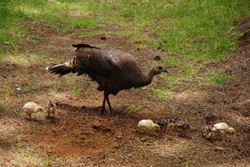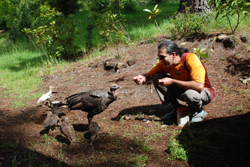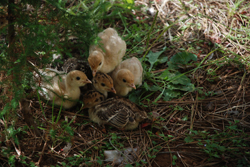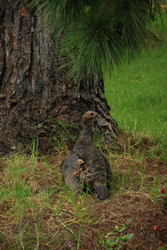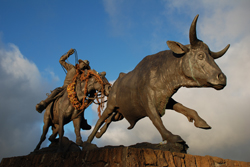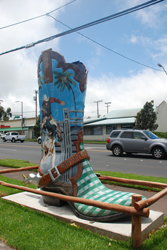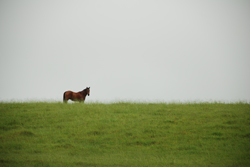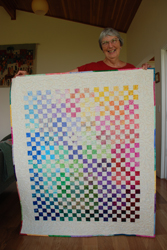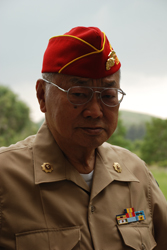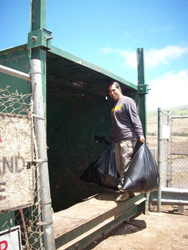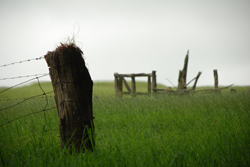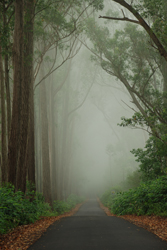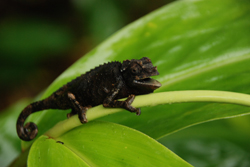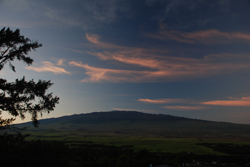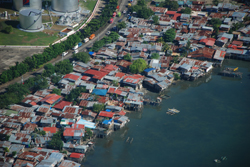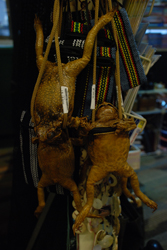North Kohala: Hiking in Kapaa
22 May, 2009, 03:57 am in "USA"
North of us, over the Kohala mountain, are the towns of Hawi and Kapa'a. Both of these towns are collections of galleries, cafes and souvenir shops that have grown up along the highway. Today we followed an inviting gravel lined with trees to get to an area with a hiking trail. A sign at the top said, "Shoreline Access" and below "Hiking only- Dangerous cliffs". This was a good sign for us because no beach access and dangerous cliffs almost guarunteed no crowds.
The trail apparently isn't frequently used. The first part was a narrow space between chest high grass plants (sugar cane?). Then the trail became a mess of different pressed down grass areas where people went off in one direction or another to the edge of the cliff to watch the waves roll in and crash into the rocky beach far below, or towards th safer walking area of tall grass and spindly forests.
The trail apparently isn't frequently used. The first part was a narrow space between chest high grass plants (sugar cane?). Then the trail became a mess of different pressed down grass areas where people went off in one direction or another to the edge of the cliff to watch the waves roll in and crash into the rocky beach far below, or towards th safer walking area of tall grass and spindly forests.
The foot path we followed led over a barbed wire fence which had been stomped low enough to step over-- under a branch then onto a more managebly worn area. Sometimes it approached the edge of the cliffs, other times it took us through grasslands or next to gnarled trees blown by the wind so they leaned away from the sharp cliffs as if frightened by vertigo.
The water below was a rich dark teal, not the paradisiacal turquiose of white beache and palm tree postcards. The water was clear enough to see the rocks and coral underneath. The sun was hot but the scragily trees offered some coolness as well as the ocean breeze. We walked down a steep hill into a gulley where people in a pickup truck had driven in and were setting up for a picnic.
We walked along and through fences until we came to a place, strangely littered with rusting metal engines and machinery. At the edge of the cliff, it looked like there had been a building but all that was left now were pieces of rusted metal and concrete sticking above the grass.
Farther down the area became a graveyard for car engines which lay scattered with grass and yellow and white flowers growing up around them. We wondered if it was the remains of a sugar refinery or loading area-- or a place where people took stolen car parts to scavange. The Kohala area had once been all sugar plantations. However, now all the plantations are gone and the sugar cane is treated like a weed. We all wonder about this since, if the plantations were revived, Hawaii could produce all its own fuel in the form of ethanol.
Farther down the area became a graveyard for car engines which lay scattered with grass and yellow and white flowers growing up around them. We wondered if it was the remains of a sugar refinery or loading area-- or a place where people took stolen car parts to scavange. The Kohala area had once been all sugar plantations. However, now all the plantations are gone and the sugar cane is treated like a weed. We all wonder about this since, if the plantations were revived, Hawaii could produce all its own fuel in the form of ethanol.
We reached another fence. By this time we'd walked along the coast far enough North to have a view of Maui in the distance like a sleeping giant under a blanket of clouds.
Drum
Drum
[ View 1 Comments
|
]
Waimea: Cowboys and Turkeys
18 May, 2009, 03:57 am in "USA"
We wake to the sounds of turkeys gobbling. There were no tropical birds singing. We do not hear the sounds of slack key guitar music drifing on a balmy breeze. Nope. We are in Hawaii but get awakened by turkeys, or rather a turkey. The neighborhood has a flock of feral turkeys in residence. Sometimes there has been a huge flock but it seems now there are just a few. Rowshan has befriended a proud mother of 8 chicks (turks?). Usually my parents don't encourage turkeys to take up residence around the house due to their tendency to eat young vegetable plants and shit profusely on vehicles when they roost in the branches above. However, they have grudgingly allowed Rowshan to make himself their guardian because among mother turkey's 8 chicks are 2 yellow ones. No one in the neighborhood has seen any yellow/white turkeys so we are interested in seeing how they grow up. Mom bought Rowshan some corn to feed them (after the breakfast oatmeal seemed to be dissapearing at a remarkable rate). Now, mother turkey will actually call up to Rowshan in the morning. We stumble out of bed, look out the window and see her looking up at us, clucking for
Aside from the turkeys, Waimea has several other characteristics which don't fit the postcard version of Hawaii. The dominant features of the region are rolling hills and pastures, cattle grazing, a shopping area named for Parker Ranch, and containing statues commemorating a famous Hawaiian cowboy, Ikua Purdy and more recently across the street, a giant cowboy boot, and another cowboy statue. Purdy became the 1908 World Champion Roper on the mainland and is credited with introducing mainlanders to the idea that Hawaii had cowboys. He was inducted into the National Cowboy Hall of Fame in 2000.
Cattle were introduced in the Hawaiian islands when they were presented to King Kamehameha as gifts. Like most species introduced to the islands, their population soon soared out of control. In 1833, King Kamehameha III brought Mexican vaqueros to get the cattle under control and start a cattle industry. The vaqueros taught their trade to the native Hawaiians. Hawaiian cowboys became known as "paniolo" which was a version of the word Espanol. Hawaii still has cowboys. I think I read that 12 manage the cattle on Parker Ranch.
My parent's moved to Hawaii in 2003. They both had lived there before and they talked about moving back and building on their land there for many years. Finally, after they retired, they moved and built the house. Rising in front of my parents' house is the huge Mauna Kea which in the winter, has snow on top. It also has a lot of telescopes because the air here is the clearest in the United States. I should correct that. It is clear on the top of the mountain. Where we are, it seems like most of the time everything is obscurred by a giant, cold, white cloud.
We also have the daily routine house things to do. Rowshan makes numerous trips to the dump. During one of these he found a fast, decent quality computer that worked almost perfectly.
So, that is Hawaii for us, cowboys, mountains and cold rain clouds. It is summer and we have our gas fireplace on. But there are many other things that remind us that we truly are in Hawaii. If we drive half an hour down the hill we get to the hot lava fields that lead to the beach (as well as numerous island paradise resorts). Down the other side, we get to the hot, green tropical Hilo side with its waterfalls and lush canyons. There is also the culture here: Hawaiian words have been pulled into everyday English-- ohana, kamaina, ono, mahalo, aloha. Many people speak with the lilt of Hawaiian pigeon in their voice. On the radio, there are a couple stations at least where you can hear slack key guitar as well as the rather surprising jah-waian (Hawaiian reggae). People greet arriving family and friends with leis, and you find flowers and coins placed on stone shrines to Hawaiian gods.
Goodbye Philippines, Hello USA
11 May, 2009, 03:17 am in "Philippines"
The non-US part of our RTW trip ended with a tortuous day in the Manila International Terminal because they do not have a place to store luggage. They don't really have much of a place for anything. Rowshan had to go into town to pick up our computer which he'd left at a repair shop. Kelleen and I eventually scored some chairs and sat watching the bags and the exciting (by comparison) flip of the flights, times, and destinations on the departures board.
When Rowshan returned, the security people wouldn't allow him back in the terminal because he didn't have a ticket. He had me paged and I brought the iPod which had a jpg of our e-ticket number, itinerary, etc. and they grudgingly allowed him inside.
When we got past the second security checkpoint into the gate area, we spent our last pesos on some drinks only to find there was another security checkpoint for our flight. We chugged our drinks, noticing they had already managed to acquire quite a collection of unopened food and drinks.
While consuming our drinks, we took a last look at the souvenirs and I seriously considered the frog bags because they are so cute yet so disgusting. I'd love to see the face of the grocery store checkout person when I pulled out my frog change purse and made it regurgitate some money. However, in the end, I decided to spare a frog's life.
When Rowshan returned, the security people wouldn't allow him back in the terminal because he didn't have a ticket. He had me paged and I brought the iPod which had a jpg of our e-ticket number, itinerary, etc. and they grudgingly allowed him inside.
When we got past the second security checkpoint into the gate area, we spent our last pesos on some drinks only to find there was another security checkpoint for our flight. We chugged our drinks, noticing they had already managed to acquire quite a collection of unopened food and drinks.
While consuming our drinks, we took a last look at the souvenirs and I seriously considered the frog bags because they are so cute yet so disgusting. I'd love to see the face of the grocery store checkout person when I pulled out my frog change purse and made it regurgitate some money. However, in the end, I decided to spare a frog's life.
My mother met us at the Kona airport in Hawaii. I was surprised to see she did not greet us with flower leis as is the custom in Hawaii. She was quick to inform us, as my dad pulled up in the truck, that they had brought us pizza instead.
Powered by My Blog 1.69. Copyright 2003-2006 FuzzyMonkey.net.
Created by the scripting wizards at FuzzyMonkey.net..
(Code modified by Rowshan Dowlatabadi)
Created by the scripting wizards at FuzzyMonkey.net..
(Code modified by Rowshan Dowlatabadi)


